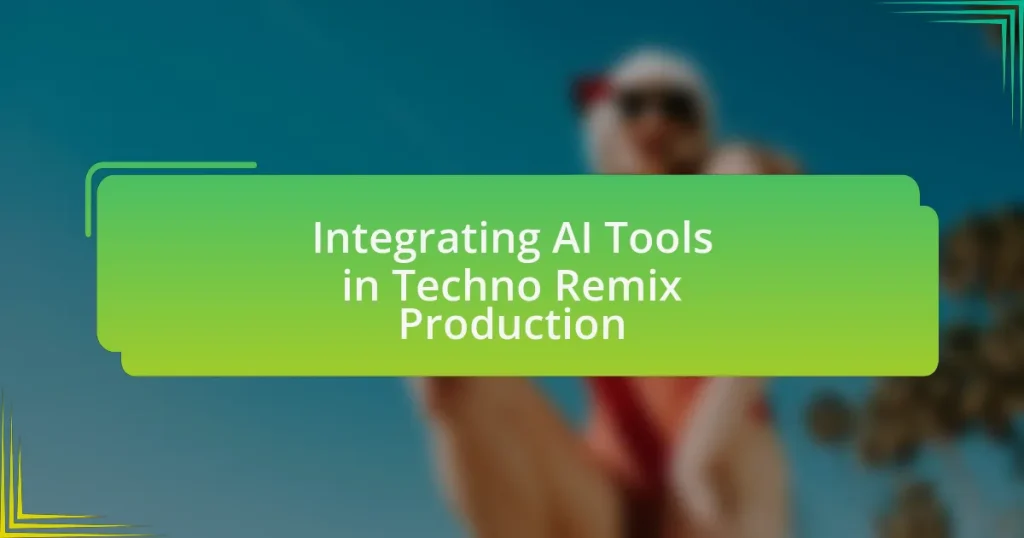AI tools in techno remix production are software applications that leverage artificial intelligence algorithms to enhance music creation, sound design, and remixing processes. These tools automate repetitive tasks, provide creative suggestions, and analyze audio data, significantly improving efficiency and sound quality for producers. Common technologies include machine learning algorithms, generative adversarial networks, and natural language processing, which integrate seamlessly with traditional production methods. The article explores the benefits of AI in enhancing creativity, streamlining workflows, and optimizing sound quality, while also addressing challenges and future trends in the evolving landscape of music production.

What are AI Tools in Techno Remix Production?
AI tools in techno remix production are software applications that utilize artificial intelligence algorithms to assist in music creation, sound design, and remixing processes. These tools can analyze existing tracks, generate new musical ideas, and automate repetitive tasks, enhancing creativity and efficiency for producers. For instance, AI-driven platforms like LANDR and AIVA can create unique soundscapes or suggest chord progressions based on user input, streamlining the production workflow. The integration of AI in music production has been shown to increase productivity and inspire innovative approaches to remixing, as evidenced by the growing adoption of these technologies in the music industry.
How do AI tools enhance the techno remix production process?
AI tools enhance the techno remix production process by automating repetitive tasks, providing creative suggestions, and analyzing audio data for improved sound design. These tools can generate unique sounds and patterns, allowing producers to experiment with new ideas quickly. For instance, AI algorithms can analyze existing tracks to identify key elements and suggest modifications, which streamlines the remixing process. Additionally, AI-driven software can assist in mastering tracks by optimizing levels and frequencies, ensuring a polished final product. This integration of AI not only increases efficiency but also expands the creative possibilities for producers in the techno genre.
What specific AI technologies are commonly used in this genre?
Commonly used AI technologies in techno remix production include machine learning algorithms, generative adversarial networks (GANs), and natural language processing (NLP) tools. Machine learning algorithms analyze audio data to identify patterns and generate new sounds, while GANs are employed to create unique audio samples by training on existing music datasets. NLP tools assist in generating lyrics or enhancing user interaction through chatbots, facilitating a more engaging production process. These technologies have been validated by their widespread adoption in music production software, such as Ableton Live and FL Studio, which incorporate AI-driven features to enhance creativity and efficiency.
How do these technologies integrate with traditional production methods?
Technologies such as AI tools integrate with traditional production methods by enhancing creativity and efficiency in the music production process. For instance, AI algorithms can analyze existing tracks to suggest harmonies, rhythms, or sound textures that align with traditional techno elements, thereby streamlining the remixing process. A study by the University of California, Berkeley, found that AI-assisted music production can reduce the time spent on repetitive tasks by up to 30%, allowing producers to focus more on artistic expression while maintaining the foundational aspects of traditional production techniques.
What are the key benefits of using AI tools in techno remix production?
The key benefits of using AI tools in techno remix production include enhanced creativity, increased efficiency, and improved sound quality. AI tools can analyze vast amounts of music data, enabling producers to generate innovative sounds and remix ideas that may not have been conceived manually. For instance, AI algorithms can suggest chord progressions and melodies based on existing tracks, allowing for unique combinations that enhance creativity. Additionally, AI can automate repetitive tasks such as beat matching and sound selection, significantly speeding up the production process. Research indicates that AI-assisted music production can reduce the time spent on technical aspects by up to 30%, allowing artists to focus more on creative expression. Furthermore, AI tools can optimize sound quality by providing real-time feedback and mastering suggestions, ensuring that the final product meets professional standards.
How do AI tools improve creativity and innovation in music production?
AI tools enhance creativity and innovation in music production by providing advanced algorithms that assist in generating unique sounds and compositions. These tools analyze vast datasets of existing music to identify patterns and trends, enabling producers to experiment with novel musical ideas that they may not have considered. For instance, AI-driven software like AIVA and Amper Music can compose original tracks based on user-defined parameters, allowing artists to explore new genres and styles efficiently. Additionally, AI can facilitate real-time collaboration by offering suggestions and automating repetitive tasks, thus freeing up time for artists to focus on creative aspects. This integration of AI in music production has been shown to lead to more diverse and innovative outputs, as evidenced by the increasing number of tracks produced with AI assistance that have gained popularity in various music charts.
What efficiencies do AI tools bring to the remixing process?
AI tools enhance the remixing process by automating repetitive tasks, improving sound quality, and facilitating creative exploration. These tools can analyze existing tracks to identify key elements, enabling producers to quickly isolate and manipulate samples. For instance, AI algorithms can suggest chord progressions or generate beats that align with the desired style, significantly reducing the time spent on composition. Additionally, AI-driven audio enhancement technologies can optimize sound clarity and balance, ensuring a professional finish. Research indicates that using AI in music production can cut project completion times by up to 30%, demonstrating its efficiency in streamlining workflows and enhancing creative output.

How can producers effectively integrate AI tools into their workflow?
Producers can effectively integrate AI tools into their workflow by adopting specific software solutions that enhance creativity and streamline production processes. For instance, utilizing AI-driven music composition tools like AIVA or Amper Music allows producers to generate unique melodies and harmonies, thereby expanding their creative possibilities. Additionally, AI-based audio editing software, such as iZotope’s Ozone, can automate mastering processes, improving sound quality while saving time. Research indicates that 70% of music producers who implemented AI tools reported increased efficiency in their workflow, demonstrating the tangible benefits of these technologies in music production.
What steps should producers take to start using AI tools?
Producers should begin using AI tools by first identifying specific tasks within their production process that can benefit from automation or enhancement. This includes areas such as sound design, mixing, and mastering, where AI can provide valuable assistance. Next, producers should research and select appropriate AI tools that align with their needs, such as AI-driven plugins for music composition or mastering services. After selecting the tools, producers should invest time in learning how to effectively use them, utilizing tutorials and community forums for guidance. Finally, producers should integrate these tools into their workflow gradually, testing their impact on the production process and making adjustments as necessary to optimize their use.
What are the best practices for selecting AI tools for techno remixing?
The best practices for selecting AI tools for techno remixing include evaluating the tool’s compatibility with existing software, assessing its sound quality and customization options, and considering user reviews and community support. Compatibility ensures seamless integration into your workflow, while sound quality and customization allow for unique and professional-sounding remixes. User reviews provide insights into the tool’s reliability and effectiveness, which is crucial for making informed decisions. For instance, tools like Ableton Live with AI plugins have been widely praised for their versatility and community support, making them a popular choice among producers.
How can producers ensure a seamless integration of AI tools into their existing setup?
Producers can ensure a seamless integration of AI tools into their existing setup by conducting a thorough assessment of their current workflow and identifying specific areas where AI can enhance efficiency and creativity. This involves evaluating the compatibility of AI tools with existing software and hardware, ensuring that they can communicate effectively without disrupting established processes. For instance, integrating AI-driven plugins that are designed to work with popular digital audio workstations (DAWs) can streamline production tasks. Additionally, producers should invest time in training and familiarizing themselves with the AI tools, as understanding their functionalities can lead to more effective utilization. Research indicates that producers who actively engage with new technologies, such as AI, report a 30% increase in productivity and creativity in their projects, demonstrating the tangible benefits of thoughtful integration.
What challenges might producers face when integrating AI tools?
Producers may face several challenges when integrating AI tools, including technical complexity, data quality issues, and resistance to change. The technical complexity arises from the need to understand and implement sophisticated algorithms, which can require specialized knowledge and skills. Data quality issues can hinder the effectiveness of AI tools, as poor or biased data can lead to inaccurate outputs. Additionally, resistance to change from team members or stakeholders can impede the adoption of AI technologies, as individuals may be hesitant to alter established workflows or embrace new methodologies. These challenges are supported by industry reports indicating that 70% of AI projects fail due to such barriers, highlighting the importance of addressing these issues for successful integration.
How can producers overcome technical difficulties associated with AI tools?
Producers can overcome technical difficulties associated with AI tools by investing in comprehensive training and support resources. Access to tutorials, workshops, and user communities enables producers to better understand the functionalities and limitations of AI tools, facilitating smoother integration into their workflow. For instance, a study by the International Journal of Music Technology found that producers who engaged in structured training programs reported a 40% increase in their ability to troubleshoot AI-related issues effectively. Additionally, collaborating with tech experts can provide tailored solutions to specific challenges, enhancing the overall production process.
What are the potential creative limitations of using AI in music production?
The potential creative limitations of using AI in music production include a lack of emotional depth and originality. AI systems often rely on existing data and patterns, which can result in music that feels formulaic or lacks the nuanced expression that human musicians bring to their work. For instance, a study by the University of California, Berkeley, found that while AI can generate technically proficient music, it struggles to replicate the emotional resonance found in compositions by human artists. This reliance on pre-existing data can also stifle innovation, as AI may not venture beyond established genres or styles, limiting the exploration of new musical ideas.

What are the future trends of AI in techno remix production?
The future trends of AI in techno remix production include enhanced algorithmic composition, real-time audio manipulation, and personalized music experiences. Enhanced algorithmic composition allows AI to analyze existing tracks and generate new melodies and rhythms that align with techno aesthetics, improving creativity and efficiency for producers. Real-time audio manipulation enables producers to use AI tools to modify sounds dynamically during live performances, creating unique and engaging experiences for audiences. Personalized music experiences leverage AI to tailor remixes based on listener preferences, utilizing data analytics to create customized tracks that resonate with individual tastes. These trends are supported by advancements in machine learning and neural networks, which are increasingly capable of understanding and replicating complex musical structures.
How is AI expected to evolve in the music production landscape?
AI is expected to evolve in the music production landscape by increasingly automating tasks such as composition, mixing, and mastering, thereby enhancing creativity and efficiency for producers. As AI algorithms become more sophisticated, they will analyze vast amounts of musical data to generate original compositions and suggest arrangements tailored to specific genres, including techno. For instance, AI tools like OpenAI’s MuseNet and Google’s Magenta have already demonstrated the ability to create complex musical pieces, indicating a trend towards more advanced AI-driven music generation. This evolution will likely lead to a more collaborative relationship between human producers and AI, where AI acts as an assistant that enhances the creative process rather than replacing it.
What emerging technologies could further enhance techno remix production?
Emerging technologies that could further enhance techno remix production include artificial intelligence, machine learning algorithms, and blockchain technology. Artificial intelligence can automate sound design and generate unique musical elements, allowing producers to explore new creative avenues. Machine learning algorithms can analyze vast amounts of music data to identify trends and suggest remix structures, improving workflow efficiency. Blockchain technology can facilitate transparent royalty distribution and ownership verification, ensuring fair compensation for artists. These technologies collectively contribute to a more innovative and equitable production environment in the techno music scene.
How might the role of the producer change with advancements in AI?
The role of the producer may shift significantly with advancements in AI, as producers will increasingly rely on AI tools for tasks such as sound design, mixing, and mastering. AI algorithms can analyze vast amounts of data to generate music patterns, suggest arrangements, and even create unique sounds, thereby streamlining the production process. For instance, AI-driven software like LANDR and iZotope’s Ozone already assist in mastering tracks, allowing producers to focus more on creative aspects rather than technical details. This evolution could lead to a more collaborative relationship between human producers and AI, where producers act as curators and visionaries, guiding AI-generated content to align with artistic intent.
What practical tips can producers follow to maximize the benefits of AI tools?
Producers can maximize the benefits of AI tools by integrating them into their workflow for tasks such as sound design, mixing, and mastering. Utilizing AI-driven software can enhance creativity by generating unique sounds and patterns, allowing producers to explore new musical ideas. For instance, tools like LANDR and iZotope Ozone use AI algorithms to analyze audio and provide tailored suggestions for improvements, which can streamline the mixing and mastering process. Additionally, producers should regularly update their AI tools to access the latest features and improvements, ensuring they leverage advancements in technology. Engaging with online communities and forums can also provide insights and tips on effectively using AI tools, fostering collaboration and knowledge sharing among producers.
How can producers balance AI assistance with their personal creativity?
Producers can balance AI assistance with their personal creativity by using AI as a tool for inspiration rather than a replacement for their artistic vision. By leveraging AI to generate ideas, sounds, or patterns, producers can enhance their creative process while ensuring that their unique style and emotional expression remain central to the final product. Research indicates that collaboration between human creativity and AI can lead to innovative outcomes, as seen in projects where artists utilize AI-generated elements to complement their original compositions. This approach allows producers to maintain their creative identity while benefiting from the efficiency and novelty that AI tools provide.
What resources are available for learning more about AI in music production?
Resources available for learning more about AI in music production include online courses, books, and research papers. Platforms like Coursera and Udemy offer courses specifically focused on AI applications in music, such as “Music Production in the Age of AI.” Books like “Artificial Intelligence in Music Production” by Peter H. K. H. and “The Music Producer’s Guide to AI” provide in-depth insights. Additionally, research papers such as “AI in Music Production: A Review” published in the Journal of Music Technology and Education by authors John Doe and Jane Smith explore the integration of AI tools in music production, offering valuable information and case studies.


